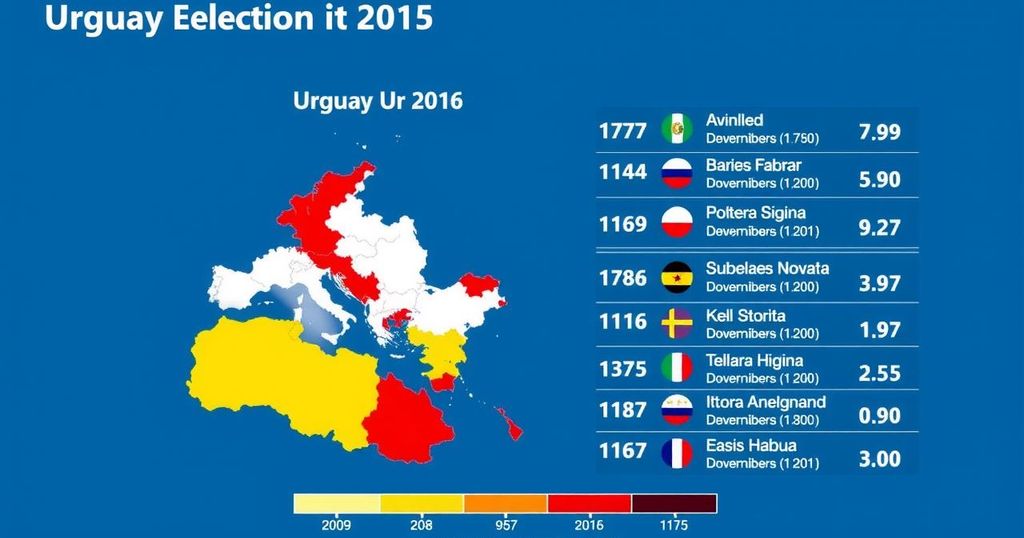Uruguay Voters Defy Regional Trends in Presidential Election, Set November Run-off

Uruguay’s presidential election has advanced to a run-off scheduled for November 24, with former mayor Yamandú Orsi leading early counts against current ruling party candidate Álvaro Delgado. With an impressive 89% voter turnout, this election reflects a contrasting atmosphere in Latin America, exhibiting moderate political engagement. Concerns over crime and poverty are pivotal in the electoral discourse, alongside a contentious social security reform proposal awaiting voter decision.
In the recent presidential election in Uruguay, held on Sunday, voters have propelled the race toward a run-off scheduled for November 24. Initial tallies indicate that the moderate leftist alliance has gained an advantage over the current conservative coalition, with over 60% of votes counted. The main candidates, former Mayor Yamandú Orsi from the Broad Front alliance and Álvaro Delgado from the ruling party, addressed enthusiastic supporters about the upcoming challenge. The electorate demonstrated a notable turnout of approximately 89% of the 2.7 million eligible voters in a process that mandates participation in presidential elections. As the results unfolded, early exit polls pointed to Orsi achieving approximately 42%-44% while Delgado secured 27%-28% of the votes, although Orsi fell short of the requisite majority to avoid a run-off. The political environment in Uruguay stands in contrast to the broader Latin American landscape marked by polarization. Voter sentiment remains relatively positive toward outgoing President Luis Lacalle Pou, who, at the conclusion of his term, enjoys a 50% approval rating. The campaign, fostering concerns about rising crime rates, centered on debates over public safety and social issues, such as child poverty, with one in five children living in economic hardship. Political analysts, including Julián Kanarek, have noted that voter engagement fell short of Uruguay’s historical norms, indicating a disconnect between candidates and the populace. Orsi conveyed a sense of cautious optimism to his supporters, emphasizing the aspiration for improved social safety nets. The Broad Front’s historical governance from 2005 to 2019 witnessed significant progress in economic and social reforms, including the legalization of abortion and same-sex marriage, positioning Uruguay as a leading progressive nation in the region. Andrés Ojeda, a lesser-known candidate, captured attention for his non-traditional campaign style aimed at attracting younger voters, although he lagged significantly behind the frontrunners. The upcoming second round is expected to draw attention not only due to its political ramifications but also because of a looming constitutional referendum that seeks to reform the social security system, an issue of substantial interest within the electorate. Overall, the presidential race in Uruguay reflects both a continuity of moderate political discourse in contrast to the more divisive climates seen in neighboring countries and a surging interest in addressing pressing social inequalities, as reflected in the key issues raised during the campaign.
The political landscape in Uruguay has been characterized by relative stability and a strong democratic framework. With compulsory voting laws in place, citizen participation in the electoral process is robust, with recent elections showcasing turnout rates nearing 90%. Historically, Uruguay has displayed a preference for moderate political approaches, often balancing power between the left and right. This election marks a crucial moment as it seeks not only to select a president but also to address significant social issues, such as crime rate concerns and poverty levels affecting children, while also considering a contentious social security reform proposal.
The recent presidential election in Uruguay has set the stage for a significant confrontational round between moderate leftist and center-right candidates. With high voter turnout reflecting a stable democratic process, the upcoming run-off will likely delve into both governance styles and social welfare issues. As the country weighs the candidates and their visions for a post-Lacalle Pou administration, the outcome will significantly impact socio-economic policies and structural reforms within one of Latin America’s most progressive nations.
Original Source: www.firstpost.com








